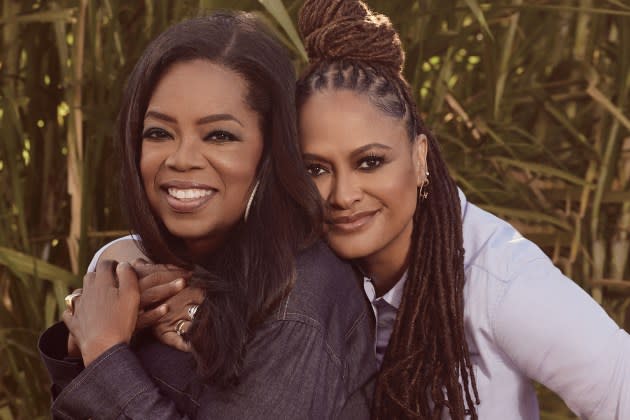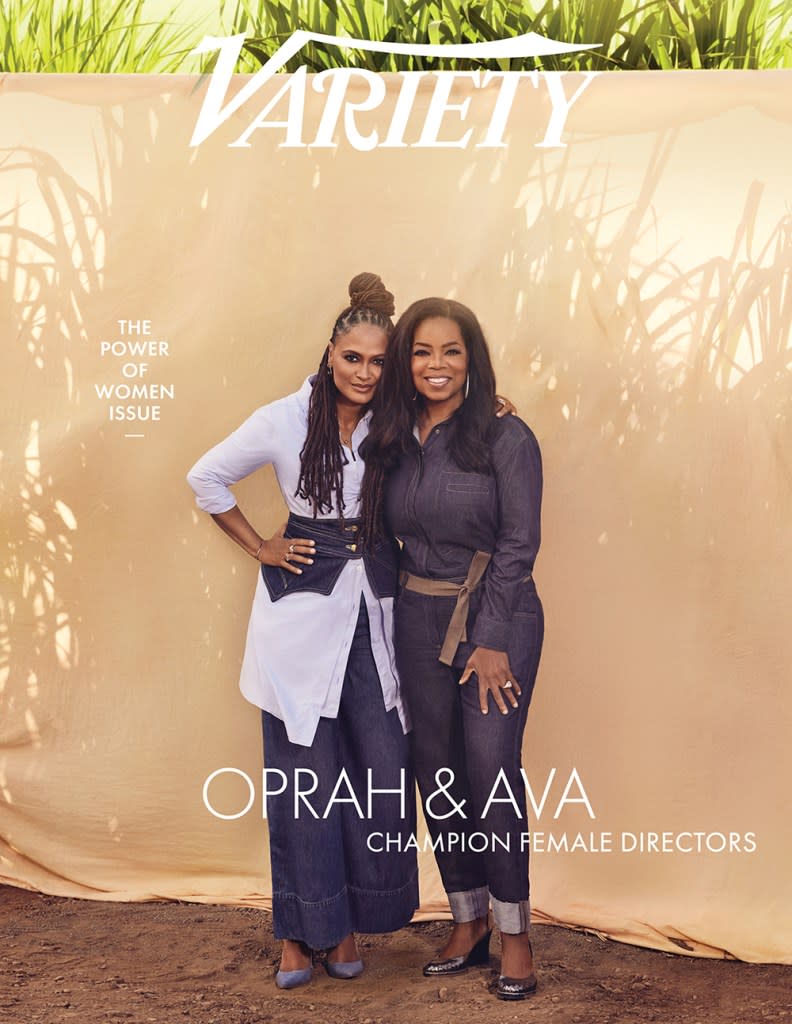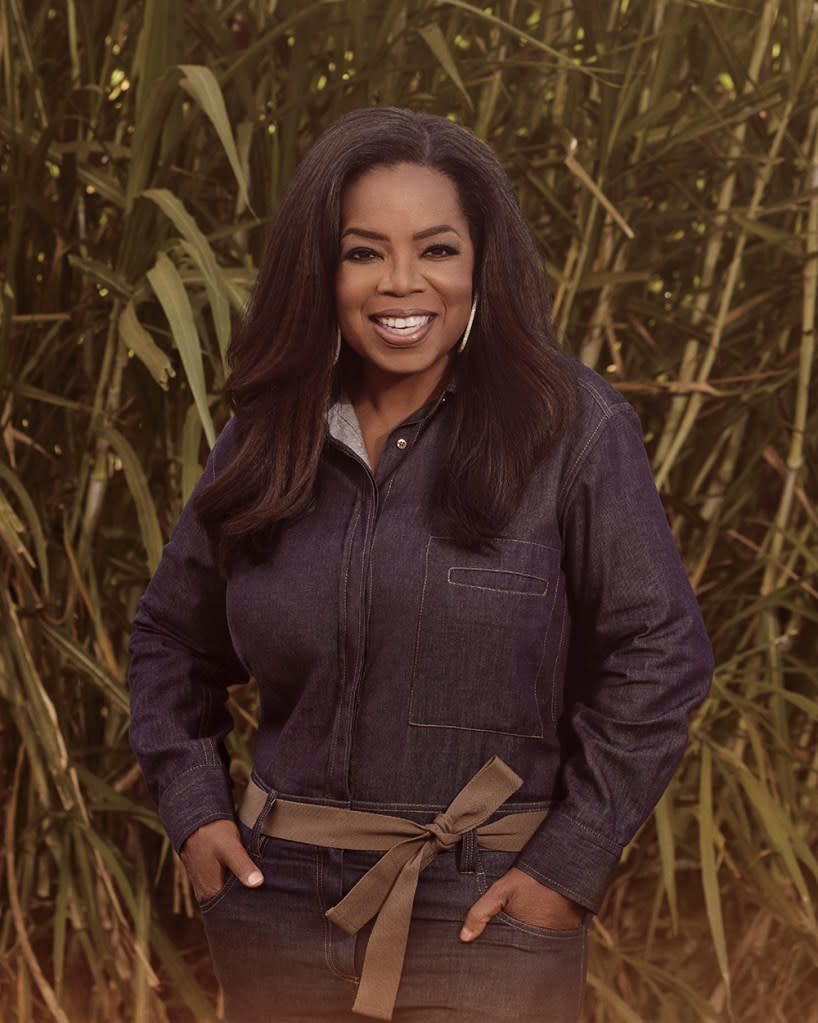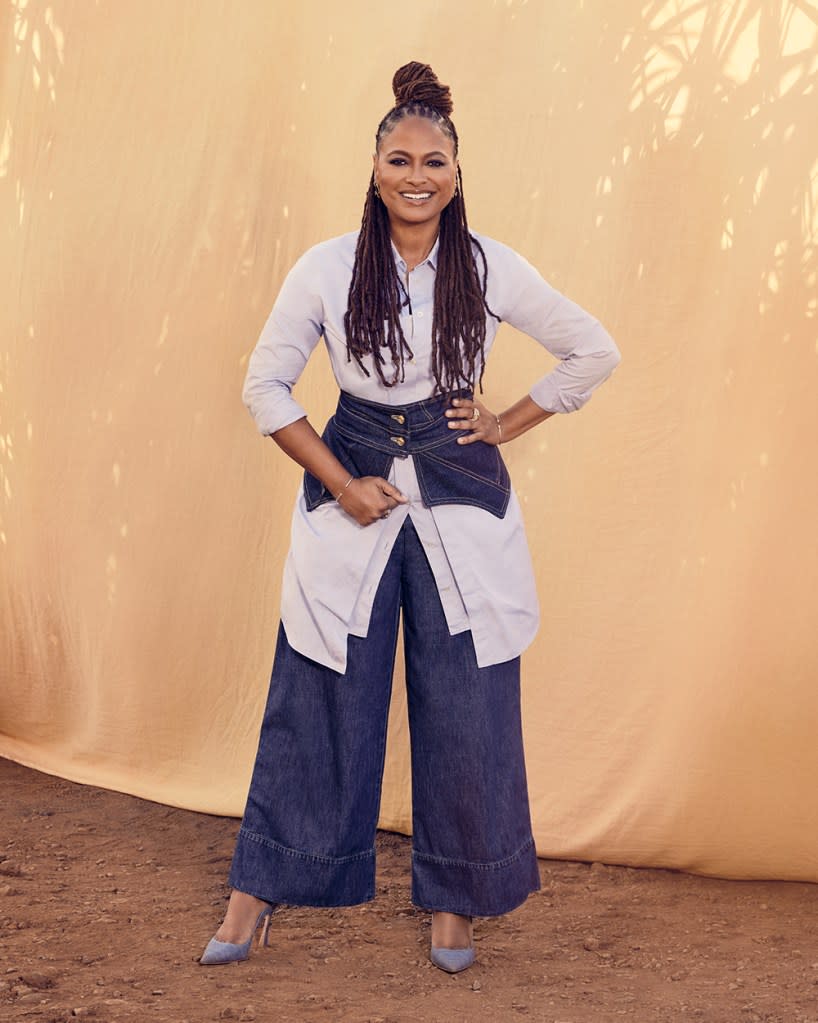How Oprah Winfrey and Ava DuVernay Led a ‘Radical Reimagining’ of TV With OWN’s ‘Queen Sugar’
- Oops!Something went wrong.Please try again later.
- Oops!Something went wrong.Please try again later.
- Oops!Something went wrong.Please try again later.
- Oops!Something went wrong.Please try again later.

Oprah Winfrey and Ava DuVernay are two of the creative leaders honored for Variety’s 2022 Power of Women presented by Lifetime. For more, click here.
Oprah Winfrey has spent most of her career talking, so it’s a little surprising that the only sound you hear from the porch of her second home in Maui is absolute silence. Forget about the ocean waves or rustling palm trees. OK, if you’re lucky enough to hang with Oprah for an entire afternoon, this zen will be interrupted by the periodic squawking of wild roosters. In such a tranquil retreat, you can think clearly, cradled in the beauty of all that Hawaii has to offer.
More from Variety
Academy Museum Gala 2023 to Honor Meryl Streep, Michael B. Jordan, Oprah Winfrey and Sofia Coppola
Venice Film Festival: Ava DuVernay to Be Honored at amfAR Gala (EXCLUSIVE)

It’s this very place of refuge, in fact, where Winfrey set a trap for filmmaker Ava DuVernay that would launch one of their greatest collaborations: OWN’s “Queen Sugar.”
As the story goes, the TV icon placed copies of Natalie Baszile’s novel “Queen Sugar” around her home — on both bedside tables, in the kitchen and on the porch — hoping DuVernay would pick it up to read it while on vacation in 2015. DuVernay doesn’t remember where the copy she finally grabbed was located, but doing so changed her life.
Seven years later, the BFFs are seated at a slate-gray table in Winfrey’s kitchen to discuss the legacy of the family drama, now in its final season, which includes hiring only women directors (41 of them), nurturing them, and then happily letting them loose on the industry.
“Queen Sugar” follows the Bordelon siblings — Nova (Rutina Wesley), Charley (Dawn-Lyen Gardner) and Ralph Angel (Kofi Siriboe) — as they navigate the trials and triumphs of sugarcane farming on Louisiana land they inherited from their father, as well as the blessings and burdens of being Black in America. “Those characters are such a fundamental part of who I know us to be as Black people,” Winfrey says, explaining why she was so bullish on adapting the material for TV. “Hardworking, caring for your family, wanting the same things that everybody is striving for: to be able to live the life that you deserve.”
DuVernay has described “Queen Sugar” as a “time capsule,” capturing the realities of the Black experience in a way that’s both timeless and incredibly specific to its era — 2016 to 2022. Similarly, the show bottles a distinct period in Winfrey and DuVernay’s individual careers: When Winfrey greenlit the series in 2015, she was already “Oprah,” the legendary TV host, but still working to prove herself as an executive overseeing the Oprah Winfrey Network. Meanwhile, DuVernay was bolstering her reputation as an auteur on the rise, having achieved success with “Selma,” but she wasn’t mononymous as “Ava,” whose cultural influence is maximized through her arts and social impact collective, Array. As their new professional identities solidified, their working relationship evolved as well.
“In the beginning, I read every script and sent notes,” Winfrey says. “By maybe the third or fourth season, I thought, ‘I’m just going to watch with the audience.’”
That means the OWN boss doesn’t know how the series ends. “And I don’t want to know, because of my trust in her,” Winfrey adds, gesturing to DuVernay, seated next to her. “We’ve developed such a rhythm and trust that I just felt like, ‘Well, what am I reading the script for? Because I’m trying to come up with a note?’“
“One of my favorite things is when she calls after she watches it,” DuVernay says. Almost on cue, Winfrey adds, “I used to watch and call crying from the treadmill.”
To be in the presence of this duo is to be instantly at ease. “Every now and then, I’ll get a call from Gayle,” DuVernay continues, referencing the CBS News anchor who also needs no last name. “The two of them just really get into it, and that’s the highest compliment. That’s the award. It’s been beautiful to be trusted.”
“But I’m not gonna lie to you,” Winfrey interjects, “I really wanted an award.”
Indeed, despite its pedigree, “Queen Sugar” has not been recognized by the Emmys. “She wanted one more than I wanted one,” DuVernay says.
“I didn’t want it for myself,” Winfrey explains. “I wanted that entire team to receive the recognition that they deserve. This is the time I miss ‘The Oprah Winfrey Show,’ because I would’ve had them on every week. Everybody would’ve known about ‘Queen Sugar.’”

And yet the show’s avid following and strong reviews haven’t been enough to break through. Earlier, on the porch, I playfully ask the pair which show would win an Emmy if they ruled the world. “Don’t get me to cry,” Winfrey replied, her voice cracking. “I mean, it’s not even about winning the Emmy; it’s about ‘Queen Sugar’ being recognized for the great work that it is — about it receiving some kind of recognition by people who understand what we did with this show.”
Of course, the series has been regularly lauded at the NAACP Image Awards and the Black Reel Awards and by the African American Film Critics Assn. And it received a special commendation during the Television Academy Honors ceremony in 2020. In terms of reach, the show is averaging a healthy 1.8 million viewers a week.
But the series debuted a good four years before people all over the world took to the streets after the murder of George Floyd. At the time, it could be more easily dismissed by critics and the media as a “Black show” and characterized as “niche,” as it tackled issues from police brutality to economic racism to movement building and protest in its 88-episode run. In being so timely, it was too far ahead of its time.
Even though “Queen Sugar” hasn’t fully gotten its due, DuVernay, Emmy-winning director and producer of “When They See Us,” insists she’s more “satisfied” with the final product than with anything else she’s done. “‘Queen Sugar’s’ the longest commitment I’ve ever had — and we’re talking relationships too,” DuVernay says. “And I did my very best every single day. In the end, there was no sadness; I was just so pleased, so proud. It was a satisfaction that was so deep, I hadn’t experienced it before.”
“Queen Sugar” signs off following the finales of other groundbreaking shows that center the Black experience, like ABC’s “Black-ish” and HBO’s “Insecure.” However, both of those are comedies, which has been the primary venue for Black stories and storytellers. “The fact that this is the longest-running dramatic television series that centers a Black family really says something about the state of American television over the history of the medium,” DuVernay says. “There have been thousands of television shows, and yet we can probably name on one hand shows that centered a Black family in a contemporary context.”
To make her point, DuVernay lists the various incarnations of the concept. Family as gangsters: “The Sopranos.” Family as undertakers: “Six Feet Under.” A family that plays football: “Friday Night Lights.” So how about dramas about Black families? “You might get five shows, if you really think hard,” she says. “We have to ask: ‘Why has this not happened? Why has this not been launched and nurtured? Why has it not been seen and celebrated?’ These are all questions that I think our industry should be looking at. As ‘Queen Sugar’ goes away, what’s in its place?”
Winfrey and DuVernay squeeze their sitdown with Variety into a very busy day, with the conversation taking place just hours before the start of the lavish three-day celebration Winfrey is throwing in honor of DuVernay’s 50th birthday. For the milestone moment, Winfrey has gathered some of DuVernay’s nearest and dearest — including DuVernay’s mother, Darlene Maye; actors Niecy Nash and Colman Domingo; fellow filmmaker J.J. Abrams; Array Filmworks president Paul Garnes (who also executive produces “Queen Sugar”); Array president Tilane Jones; power attorney Nina Shaw; CAA’s Maha Dakhil Jackson and Ford Foundation president Darren Walker.
Gayle King also has flown in, occupying the front-row seat she’s had to Winfrey and DuVernay’s partnership and friendship during the past decade. “They had an instant connection, and the friendship just continues to thrive and blossom,” says King.
To an outside observer, Winfrey and DuVernay appear to be “superwomen” — and King would agree. But, she notes: “They were both very strong before they became friends. I look at them as a one-two punch. The two of them clicked and they’re still clicking.”

Winfrey first learned about DuVernay from David Oyelowo, her co-star in 2013’s “Lee Daniels’ The Butler,” who recommended she watch the filmmaker’s feature “Middle of Nowhere,” in which he starred. Captivated by the “lovely Black woman wearing glasses just like mine,” as Winfrey always describes DuVernay, she invited the filmmaker to a Mother’s Day brunch, planned in hopes that they would become friends. From that afternoon on, the pair have created magic together, beginning with 2014’s “Selma,” and continuing with 2018’s “A Wrinkle in Time” (both of which Winfrey starred in); as well as the 2019 limited series “When They See Us” (Winfrey served as an executive producer); and “Queen Sugar.”
It took DuVernay three tries before she nailed her adaptation of Baszile’s novel. Her first script was a little too on the nose for Winfrey’s taste, and the second a bit more out there. DuVernay cracked the code when Winfrey suggested she use the book “as a seed, but then let it blossom.”
Winfrey recalls reading the final version of the pilot, feeling “a sense of recognition, familiarity” in the Bordelon family story. “What everybody wants is to be able to see themselves on television, have their lives reflected,” Winfrey says. “I felt, having come from the South, that there was an entire audience that had not been tapped into, and I believed if we created this, they would come, and they would see themselves.”
In July, Winfrey found “Queen Sugar” mirroring her own life when her father, Vernon Winfrey, died. Winfrey had traveled back to her Nashville, Tenn., hometown to be with him in his final days and was thinking about the show as she managed the dynamics of reuniting with extended family — including relatives she hadn’t seen since she was a preteen — in a time of grief. “I held the Bordelon family in my heart as I was going through my own situation,” Winfrey says.
Ahead of her father’s funeral, Winfrey called DuVernay: “All the family members decided to wear white,” she told her friend. “We’re going to ‘Queen Sugar’ it.”
But the experience was also reminiscent of the powerful scene from the pilot where Ralph Angel and his young son, Blue (Ethan Hutchison), sit at the bedside of dying patriarch Ernest Bordelon (Glynn Turman). It’s this sequence that made the greatest impression on Winfrey, especially now that she’s lived it. “The way Ava framed the shot — those three dark-skinned Black men in the hospital room offering their love to each other — is a thing I had never seen before or felt before, nor had anyone else,” Winfrey recalls. “I recognized how transformative it was, and not just for Black audiences.”
Winfrey had learned this lesson 20 years ago, after going to South Africa at Christmas for her talk show and filming a group of children opening gifts that she’d brought them. “I’ll never forget a call from a woman in Alabama — ignorant though it was — who said, ‘I didn’t know those children felt the same way my children feel. But they look like my children when they’re opening presents,’” Winfrey recalls. “I realized how transformative it is for people who don’t think that we feel like that with our families, to see something like that.”
When creating “Queen Sugar,” DuVernay decided that she would hire only women to direct. That pledge ultimately led to the enlistment of 41 women directors, 39 of whom had never helmed an episode of television before “Queen Sugar,” despite directing critically acclaimed and award-winning independent films, music videos or works of theater and art. DuVernay was also a relative newcomer to television, having directed just one episode of “Scandal” before Winfrey tapped her to lead “Queen Sugar.”
“I remember getting the call from Ava saying, ‘I have this idea: What if we just have all women directors?’” Winfrey says. “I go, ‘All women directors? Can we do that?’ Ava goes, ‘Yeah, we can do that.’”
DuVernay chimes in, “Because you own the network.”
In her estimation, OWN was the key to making it work. “There’s no way it would have happened if there was not a network to support it,” DuVernay says. “It would have been something that might have lasted for one season. Being on a Black, woman-owned network allowed us to not just let hiring all women be an idea, but a real movement.”
When some in the entertainment industry learned of Winfrey and DuVernay’s pledge, they reacted with skepticism. “These were all real things that we heard: ‘It won’t last.’ ‘There aren’t enough women directors to do it.’ ‘This is just a fluke,’” DuVernay recalls. “But seven seasons later, this has become a real movement in episodic directing that will reverberate through our industry for many years to come.”
Where the industry had failed to provide these women opportunities to work in TV, “Queen Sugar” swooped in and filled the gap, and the ripple effect of this decision has been immediate. By the second or third season of “Queen Sugar,” other showrunners were asking DuVernay to share her Rolodex. “Every show in town, from ‘Ozark’ to ‘Lovecraft Country’ to ‘Westworld,’ called and inquired about these women,” DuVernay says. “To be a ‘Queen Sugar’ director is basically a mark of distinction, and they’re hired so rapidly that we can’t even hire them for a second and third round.”
For example: After working on “Queen Sugar” in Season 2, Amanda Marsalis helmed episodes of “Ozark” and “Westworld.” And Season 1 director Victoria Mahoney was subsequently hired to lead the second unit on “Star Wars: Episode IX” before hopping over to “Lovecraft Country” and her current gig directing “The Old Guard 2.”
“These directors have used ‘Queen Sugar’ as a platform to go on and tell their own stories, and to help others tell stories across the dial: every network, every streamer, every studio,” DuVernay says.
Regardless of the ever-growing résumés of these “Queen Sugar” alums, statistics are still abysmal for women directors. In 2021, UCLA’s annual “Hollywood Diversity Report” found that in the period from 2018- 19, just 29.7% of all episodes of cable television were directed by women (with 22.7% directed by white women and only 7% by women of color).
“But we did our part,” Winfrey says.
“Well, it’s systemic,” DuVernay replies. “So in any of our lifetimes, this won’t be fixed. But it’s about what steps you took while you had the power to do something. Did you just benefit from being the one person in the room? Or did you make sure that you not only had a seat at the table but created another room? We have to think about what will be next, because this is so deeply ingrained. We’re talking a 100-year-old industry — I don’t think there’s any snap of the fingers that’s going to get it done.”
With “Queen Sugar,” they’ve created a blueprint for what’s possible, DuVernay says, “when you stop putting women in labs and workshops and shadowing, and you just give them the friggin’ job. Until other networks are just as open to having this kind of radical reimagining of who could be in charge, it’ll continue to grow at a snail’s pace.”
Looking back on “Queen Sugar’s” seven seasons, DuVernay tells Winfrey that she’s especially pleased about this one thing: “That I never asked you to come on and make a guest appearance.” Winfrey laughs: no, she didn’t want to clock a cameo.
“I was a character on ‘Greenleaf,’” Winfrey explains, noting her last TV role. “One night after the seventh or eighth take — it’s, like, one in the morning — I say to myself, ‘Self, what the hell are you doing here opening this car door and getting in for the seventh time? You need to get yourself back home.’”
DuVernay laughs, adding: “I hope that she acts more. She is, I think, the finest actress of her category.”
“That means ‘One who was a former talkshow host,’” Winfrey says with a grin.
But DuVernay pushes on, comparing Winfrey to Jessica Chastain or Zendaya, in the sense that they stand apart from their peers. Winfrey dodges the compliment and repeats that she isn’t gung-ho about stepping back in front of the camera. “Listen,” she says, “I am living on a mount in Maui.”
“But if something perfect came along …” DuVernay says, teasing Winfrey, nudging her, because she clearly knows something no one else does. Winfrey finally spills it: “I actually do think something perfect is coming, and I kind of know what it is.”
Though she’s not prepared to divulge specifics, Winfrey isn’t quite ready to turn her back on acting. “Let me tell you,” she says. “It takes a lot to get me off the porch.”
Production: FX Group/Hawaii
Best of Variety
'House of the Dragon': Every Character and What You Need to Know About the 'Game of Thrones' Prequel
25 Groundbreaking Female Directors: From Alice Guy to Chloé Zhao
Sign up for Variety’s Newsletter. For the latest news, follow us on Facebook, Twitter, and Instagram.

